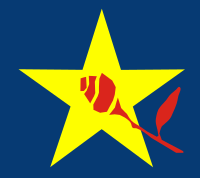Social Democratic Union of Macedonia
| Social Democratic Union of Macedonia | |
|---|---|
 | |
| Leader | Zoran Zaev |
| Founder | Branko Crvenkovski |
| Vice-presidents |
Radmila Šekerinska Frosina Remenski Vančo Uzunov Damjan Mančevski Aleksandar Kiracovski |
| Founded | 21 April 1991 |
| Headquarters | Skopje |
| Youth wing | Social Democratic Youth of Macedonia |
| Ideology |
Social democracy[1] Social liberalism |
| Political position | Centre-left |
| European affiliation | Party of European Socialists (associate) |
| International affiliation | Progressive Alliance |
| Colours | Blue, Red and Yellow |
| Macedonian Parliament |
37 / 123 |
| Mayors |
5 / 81 |
| Website | |
| http://www.sdsm.org.mk | |
|
Politics of the Republic of Macedonia Political parties Elections | |
The Social Democratic Union of Macedonia (Macedonian: Социјалдемократски сојуз на Македонија, Socijaldemokratski sojuz na Makedonija, SDSM) is a social-democratic and main centre-left political party in Macedonia.[2] It is the successor of the League of Communists of Macedonia, the ruling party during the socialist period which ruled SR Macedonia as a constituent republic of SFR Yugoslavia from 1945 to 1990. The current party leader is Zoran Zaev.
From September 1992 to 1998 and from 2002 to 2006 the SDSM was the largest party in the Macedonian parliament and the main party in the government, and has shown a moderate and reconciliatory attitude towards ethnic minorities in Macedonia. Concerning its ideology, it can be said that although the SDSM is a successor of a communist party and claims to be social-democratic, the influential business lobby in SDSM is moving the party in a neoliberal direction. SDSM has fewer supporters in low educated classes and more supporters in classes with higher education level. SDSM also has fewer supporters in the villages and rural areas, and much more supporters in the cities.
History
The party lost the 1998 elections, but at the legislative elections, 15 September 2002, the party became the strongest party winning 43 out of 120 seats in the Macedonian Assembly as the major party of the Together for Macedonia alliance, led by SDSM and the Liberal Democratic Party. Together for Macedonia ruled in coalition with the Democratic Union for Integration.

The longstanding former leader of the party was Branko Crvenkovski, who served as prime minister of Macedonia from 1992 to 1998 and from 2002 to 2004. Crvenkovski was then elected on the Social Democratic ticket to become President of the Republic of Macedonia a post that he held until May 2009. The Presidency was handed to Vlado Bučkovski, who was the party leader and Prime Minister until the 2006 Parliamentary elections. Other prominent members of this party are: Jani Makraduli, Goran Mincev, Nikola Popovski, Ilinka Mitreva, Nikola Kjurkciev and others. The SDSM is a member of the Progressive Alliance and an associate affiliate of the Party of European Socialists (PES).
On 30 November 2005 one of the most prominent members of the SDSM, Tito Petkovski, who ran for president in 1999 and came in second place, left the party to form the New Social Democratic Party. This is the second major split from the SDSM, the first one being the 1993 split of Petar Gošev, who has established the Democratic Party.
At the last parliamentary elections in Macedonia, held on 1 June 2008, the coalition Sun (of which SDSM was the leading party) was defeated, receiving 18 of the 120 seats. At the last local elections from 2009, the Social Democrats won in 7 out of 84 municipalities in the country.[3] The Social Democratic Union of Macedonia is the second largest political party and the main opposition party in the country.
In May 2009, after finishing the 5-year-term of President of the Republic of Macedonia, Branko Crvenkovski returned to the SDSM and was reelected leader of the party. He reorganized the party profoundly,[4] but resigned after the party's defeat in the 2013 local elections. In June 2013, Zoran Zaev was elected as the new leader.[5]
The party was defeated in the 2014 elections by the Internal Macedonian Revolutionary Organization—Democratic Party of Macedonian National Unity (VMRO—DPMNE). In early 2015, Zoran Zaev was accused of planning a coup and being a spy for a foreign intelligence agency. Zaev released information that alleged VMRO member and Prime Minister Nikola Gruevski wiretapped 20,000 citizens. In May 2015, large protests including SDSM members began in Skopje. Large crowds gathered to protest on May 17, demanding the resignation of Prime Minister Gruevski, who refused and said a rally of supporters will occur on May 18. The number of protestors was estimated to be in the tens of thousands, more than 40,000. Zaev claimed the number of protestors reached 100,000, and said that some of them would remain there for days until Gruevski resigns. European Union diplomats offered to mediate a solution to the crisis. The political crisis was exceeded with the contract in July 2015 which predicted new transitional government with SDSM from September 2015, resignation from Nikola Gruevski in December 2015, and early parliament elections in April 2016.
Party leaders
- Branko Crvenkovski (1991–2004)
- Vlado Bučkovski (2004–2006)
- Radmila Šekerinska (2006–2008)
- Zoran Zaev (2008–2009)
- Branko Crvenkovski (2009–2013)
- Zoran Zaev (2013–present)
See also
References
- ↑ Nordsieck, Wolfram, "Macedonia", Parties and Elections in Europe, retrieved 4 October 2012
- ↑ Janusz Bugajski (2002). Political Parties of Eastern Europe: A Guide to Politics in the Post-Communist Era. M.E. Sharpe. pp. 739–. ISBN 978-1-56324-676-0. Retrieved 6 February 2013.
- ↑ Vecer newspaper
- ↑ Makfax Independent News Agency
- ↑
External links
| ||||||||||||||||||||||||||||||||||||||||||||||||||||